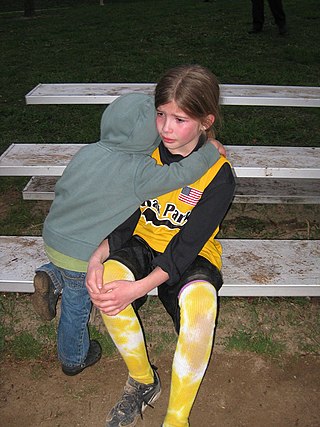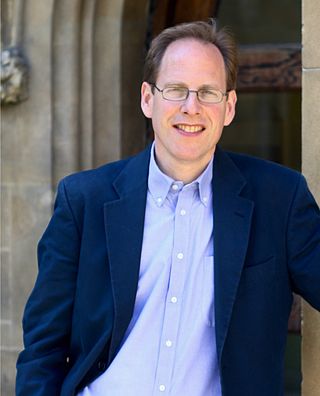
Asperger syndrome (AS), also known as Asperger's, is a neurodevelopmental condition characterized by significant difficulties in social interaction and nonverbal communication, along with restricted and repetitive patterns of behaviour and interests. The syndrome is no longer recognised as a diagnosis in itself, having been merged with other conditions into autism spectrum disorder (ASD). It was considered to differ from other diagnoses that were merged into ASD by relatively unimpaired spoken language and intelligence.

The American Psychiatric Association (APA) is the main professional organization of psychiatrists and trainee psychiatrists in the United States, and the largest psychiatric organization in the world. It has more than 37,000 members who are involved in psychiatric practice, research, and academia representing a diverse population of patients in more than 100 countries. The association publishes various journals and pamphlets, as well as the Diagnostic and Statistical Manual of Mental Disorders (DSM). The DSM codifies psychiatric conditions and is used mostly in the United States as a guide for diagnosing mental disorders.

Empathy is the capacity to understand or feel what another person is experiencing from within their frame of reference, that is, the capacity to place oneself in another's position. Definitions of empathy encompass a broad range of social, cognitive, and emotional processes primarily concerned with understanding others. Types of empathy include cognitive empathy, emotional empathy, somatic empathy, and spiritual empathy.

Leo Kanner was an Austrian-American psychiatrist, physician, and social activist best known for his work related to classic autism. Before working at the Henry Phipps Psychiatric Clinic at the Johns Hopkins Hospital, Kanner practiced as a physician in Germany and South Dakota. In 1943, Kanner published his landmark paper Autistic Disturbances of Affective Contact, describing 11 children who displayed "a powerful desire for aloneness" and "an obsessive insistence on persistent sameness." He named their condition "early infantile autism," which is now known as classic autism. Kanner was in charge of developing the first child psychiatry clinic in the United States and later served as the Chief of Child Psychiatry at the Johns Hopkins Hospital. He is one of the co-founders of The Children's Guild, a nonprofit organization serving children, families and child-serving organizations throughout Maryland and Washington, D.C., and dedicated to "Transforming how America Cares for and Educates its Children and Youth." He is widely considered one of the most influential American psychiatrists of the 20th century.
Bruno Bettelheim was an Austrian-born psychologist, scholar, public intellectual and writer who spent most of his academic and clinical career in the United States. An early writer on autism, Bettelheim's work focused on the education of emotionally disturbed children, as well as Freudian psychology more generally. In the U.S., he later gained a position as professor at the University of Chicago and director of the Sonia Shankman Orthogenic School for Disturbed Children, and after 1973 taught at Stanford University.
Reality tunnel is a theory that, with a subconscious set of mental filters formed from beliefs and experiences, every individual interprets the same world differently, hence "Truth is in the eye of the beholder". It is similar to the idea of representative realism, and was coined by Timothy Leary (1920–1996). It was further expanded on by Robert Anton Wilson (1932-2007), who wrote about the idea extensively in his 1983 book Prometheus Rising.

Sir Simon Philip Baron-Cohen is a British clinical psychologist and professor of developmental psychopathology at the University of Cambridge. He is the director of the university's Autism Research Centre and a Fellow of Trinity College. In 1985, Baron-Cohen formulated the mind-blindness theory of autism, the evidence for which he collated and published in 1995. In 1997, he formulated the foetal sex steroid theory of autism, the key test of which was published in 2015.

The autism rights movement, also known as the autistic acceptance movement, is a social movement within the context of disability rights that emphasizes a neurodiversity paradigm, viewing the autism spectrum as a result of natural variations in the human brain rather than as a disease to be cured. The movement advocates for several goals, including greater acceptance of autistic traits and behaviors; services that focus on improving quality of life and well-being instead of suppression and masking of autistic traits or imitations of the behaviors of neurotypical (non-autistic) peers ; the creation of social networks and events that allow autistic people to socialize on their own terms; and the recognition of the autistic community as a minority group.
A spoiled child or spoiled brat is a derogatory term aimed at children who exhibit behavioral problems from being overindulged by their parents or other caregivers. Children and teens who are perceived as spoiled may be described as "overindulged", "grandiose", "narcissistic" or "egocentric-regressed". When the child has a neurological condition such as autism, ADHD or intellectual disability, observers may see them as "spoiled”. There is no specific scientific definition of what "spoiled" means, and professionals are often unwilling to use the label because it is considered vague and derogatory. Being spoiled is not recognized as a mental disorder in any of the medical manuals, such as the ICD-10 or the DSM-IV, or its successor, the DSM-5.

Michael Eric Dyson is an American academic, author, ordained minister, and radio host. He is a professor in the College of Arts and Science and in the Divinity School at Vanderbilt University. Described by Michael A. Fletcher as "a Princeton Ph.D. and a child of the streets who takes pains never to separate the two", Dyson has authored or edited more than twenty books dealing with subjects such as Malcolm X, Martin Luther King Jr., Marvin Gaye, Barack Obama, Nas's debut album Illmatic, Bill Cosby, Tupac Shakur and Hurricane Katrina.

Roy Richard Grinker is an American author and Professor of Anthropology, International Affairs, and Human Sciences at The George Washington University.
The empathising–systemising (E–S) theory is a theory on the psychological basis of autism and male–female neurological differences originally put forward by English clinical psychologist Simon Baron-Cohen. It classifies individuals based on abilities in empathic thinking (E) and systematic thinking (S). It measures skills using an Empathy Quotient (EQ) and Systemising Quotient (SQ) and attempts to explain the social and communication symptoms in autism spectrum disorders as deficits and delays in empathy combined with intact or superior systemising.

Societal and cultural aspects of autism or sociology of autism come into play with recognition of autism, approaches to its support services and therapies, and how autism affects the definition of personhood. The autistic community is divided primarily into two camps; the neurodiversity movement and the Pathology paradigm. The pathology paradigm advocates for supporting research into therapies, treatments, and/or a cure to help minimize or remove autistic traits, seeing treatment as vital to help individuals with autism, while the neurodiversity movement believes autism should be seen as a different way of being and advocates against a cure and interventions that focus on normalization, seeing it as trying to exterminate autistic people and their individuality. Both are controversial in autism communities and advocacy which has led to significant infighting between these two camps. While the dominant paradigm is the pathology paradigm and is followed largely by autism research and scientific communities, the neurodiversity movement is highly popular among most autistic people, within autism advocacy, autism rights organizations, and related neurodiversity approaches have been rapidly growing and applied in the autism research field in the last few years.

Autism's False Prophets: Bad Science, Risky Medicine, and the Search for a Cure is a 2008 book by Paul Offit, a vaccine expert and chief of infectious diseases at Children's Hospital of Philadelphia. The book focuses on the controversy surrounding the now discredited link between vaccines and autism. The scientific consensus is that no convincing scientific evidence supports these claims, and a 2011 journal article described the vaccine-autism connection as "the most damaging medical hoax of the last 100 years".
Social constructionism, a branch of sociology, queries commonly held views on the nature of reality, touching on themes of normality and abnormality within the context of power and oppression in societal structures.

The autism spectrum, often referred to as just autism, autism spectrum disorder (ASD) or sometimes autism spectrum condition (ASC), identifies a loosely defined cluster of neurodevelopmental traits characterized by challenges in social interaction, verbal and nonverbal communication, and often repetitive behaviors and restricted interests. Other common features include unusual responses to sensory stimuli and a preference for sameness or unusual adherence to routines.
Autism-friendly means being aware of social engagement and environmental factors affecting people on the autism spectrum, with modifications to communication methods and physical space to better suit individual's unique and special needs.
Paul Ashwood is an associate professor of immunology at the MIND Institute at the University of California Davis. His lab conducts research regarding the potential role of immune system disorders in autism, as well as other neurodevelopmental disorders such as Fragile X syndrome, Tourette syndrome, schizophrenia and mood disorders.
The history of autism spans over a century, autism has been subject to varying treatments, being pathologized or being viewed as a beneficial part of human neurodiversity. The understanding of autism has been shaped by cultural, scientific, and societal factors throughout history, and its perception and treatment change over time as scientific understanding of autism develops.

Scott O. Lilienfeld was a professor of psychology at Emory University and advocate for evidence-based treatments and methods within the field. He is known for his books 50 Great Myths of Popular Psychology, Brainwashed, and others that explore and sometimes debunk psychological claims that appear in the popular press. Along with having his work featured in major U.S. newspapers and journals such as The New York Times, The New Yorker, and Scientific American, Lilienfeld made television appearances on 20/20, CNN and the CBS Evening News.









